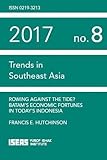Rowing Against the Tide? : Batam's Economic Fortunes in Today's Indonesia / Francis E Hutchinson.
Material type: TextPublisher: Singapore : ISEAS Publishing, [2017]Copyright date: ©2017Description: 1 online resource (37 p.)Content type:
TextPublisher: Singapore : ISEAS Publishing, [2017]Copyright date: ©2017Description: 1 online resource (37 p.)Content type: - 9789814786393
- 9789814786409
- online - DeGruyter
- Issued also in print.
| Item type | Current library | Call number | URL | Status | Notes | Barcode | |
|---|---|---|---|---|---|---|---|
 eBook
eBook
|
Biblioteca "Angelicum" Pont. Univ. S.Tommaso d'Aquino Nuvola online | online - DeGruyter (Browse shelf(Opens below)) | Online access | Not for loan (Accesso limitato) | Accesso per gli utenti autorizzati / Access for authorized users | (dgr)9789814786409 |
Frontmatter -- FOREWORD -- Rowing Against the Tide? Batam's Economic Fortunes in Today's Indonesia -- Rowing Against the Tide? Batam's Economic Fortunes in Today's Indonesia -- THE REASSERTION OF CENTRAL CONTROL -- CONCLUSION
restricted access online access with authorization star
http://purl.org/coar/access_right/c_16ec
Despite its good infrastructure and proximity to Singapore, Batam's economic performance has taken a turn for the worse, with declining levels of foreign direct investment (FDI) and exports. Well-known firms in the electronics sector have closed shop, the shipping industry is in the doldrums, and unemployment rates have begun to climb. The environment for business is not as conducive as it used to be, with bureaucratic overlaps, persistent red tape, and shortages of land for investors. And, rather than seeking to attract large-scale investments in manufacturing or services, government campaigns have focussed on traditional economic activities such as fishing and farming. There are three reasons for this state of affairs. First, Indonesia's decentralization reforms have made doing business in Batam much more complicated than it used to be. Rather than dealing with one all-powerful central government agency, investors need to deal with three levels of government each with veto power. Second, Batam's economic transformation over the past quarter-century has attracted large numbers of migrants from other parts of the country. This has engendered a cultural sub-nationalist movement, which has sought to protect local interests and identities to the detriment of the economy. Third, structural changes in Indonesia's economy and changing corporate strategies have meant that investment into the country seeks to tap its domestic market as opposed to producing for export. In this context, Batam is not a viable destination due to its distance from large population centres, bad connectivity, high labour costs, and unattractive tax framework. While recent measures have sought to reduce red tape, fight corruption, and improve the islands infrastructure, it is possible that Batam needs to re-orient its business model away from producing for export and towards enabling firms on the island to also cater to Indonesia's burgeoning domestic consumer base.
Issued also in print.
Mode of access: Internet via World Wide Web.
In English.
Description based on online resource; title from PDF title page (publisher's Web site, viewed 30. Aug 2021)


